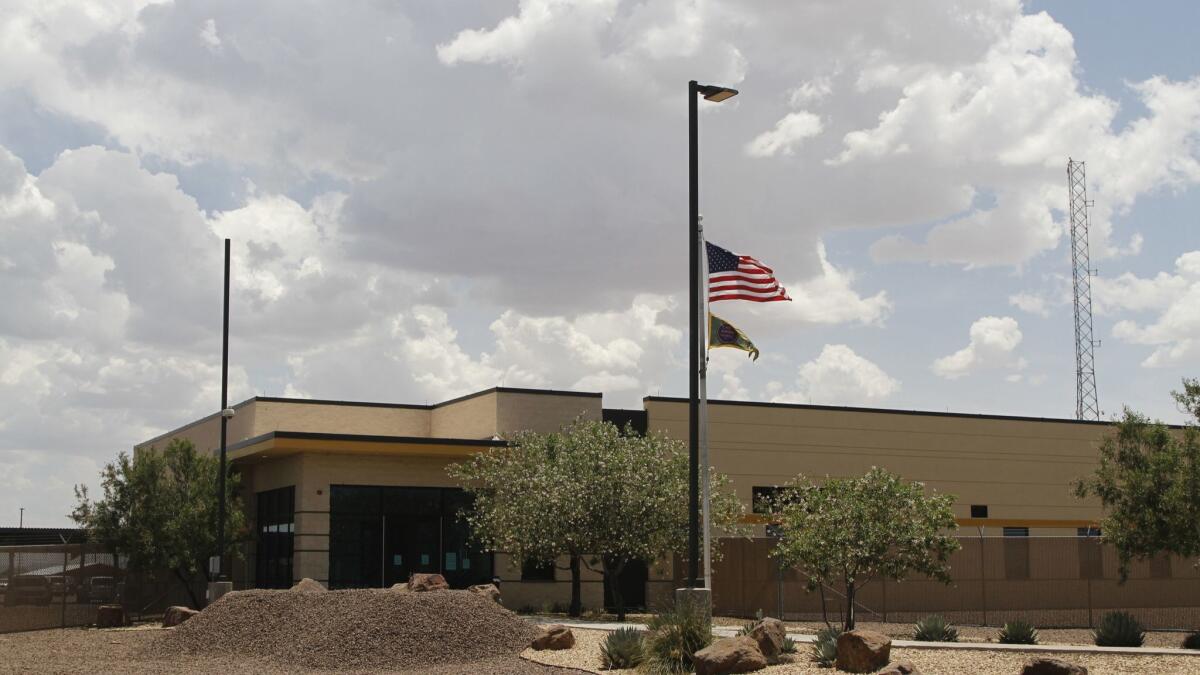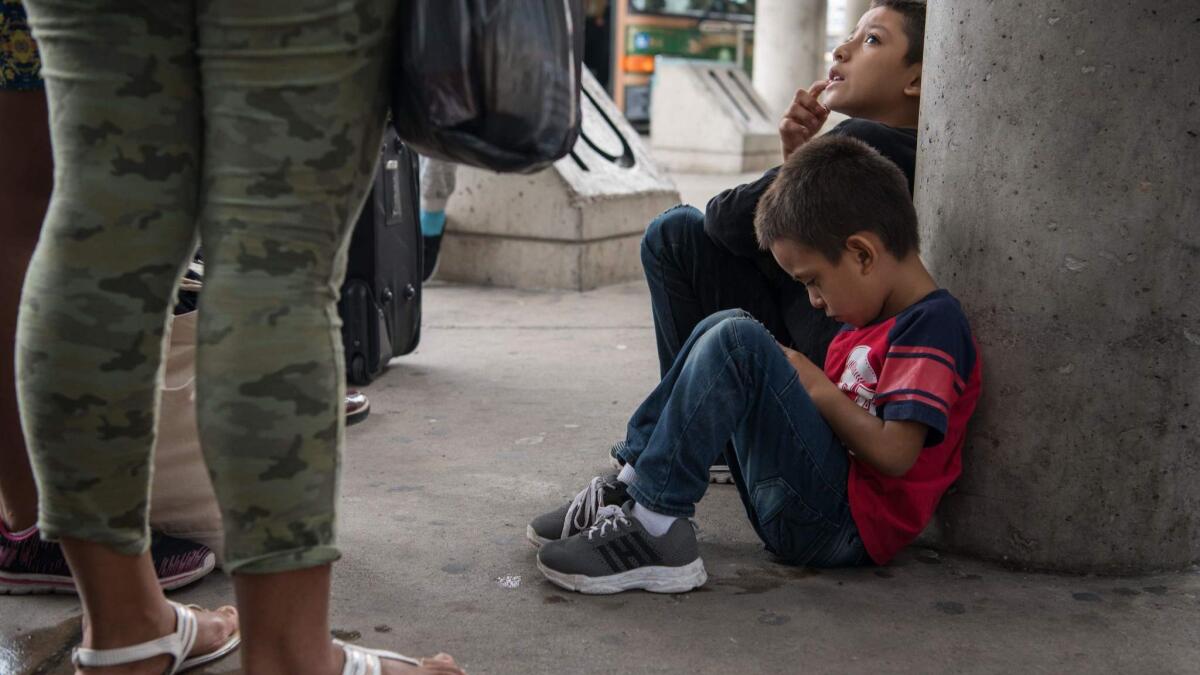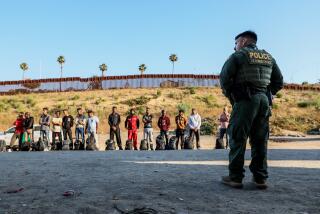Lawsuit accuses U.S. government of holding migrant children in ‘deplorable’ conditions

A team of attorneys asked a U.S. District Court in California to issue a temporary restraining order against the federal government Wednesday afternoon, arguing that children in several immigration detention facilities in Texas are being held in “deplorable” conditions in violation of an earlier court settlement.
According to a statement from some of the attorneys, the temporary restraining order and a contempt order call for U.S. Customs and Border Protection to “immediately start processing children for release to parents and relatives” and “to provide them with basic necessities including adequate food, clean water, medical care, and access to sleep.”
The temporary restraining order “further demands immediate, unfettered access of medical experts to the facilities, to evaluate and treat the children,” according to the statement.
The motion, which cites detention facilities in the Border Patrol’s El Paso and Rio Grande Valley sectors, also asks the court to hold the U.S. government in contempt for failing to comply with basic child welfare standards. Those standards were agreed upon in a 1997 court settlement known as the Flores agreement, which set legal requirements for the housing of children seeking asylum or in the country illegally.
“The conditions within which [children] are held could be compared to torture facilities,” states a declaration by Dr. Dolly Lucio Sevier, a pediatrician who visited one of the facilities this month, in the lawsuit. “That is, extreme cold temperatures, lights on 24 hours a day, no adequate access to medical care, basic sanitation, water, or adequate food.”

The lawsuit is just the latest ripple in an intensifying political uproar over the treatment of immigrant children. Last week, a Department of Justice lawyer appeared to equivocate over whether detained children needed to be supplied with such basics as toothpaste, beds and soap.
On Monday, a photo of a young Salvadoran father, Oscar Alberto Martinez Ramirez, and his nearly 2-year-old daughter, Valeria, face down on the banks of the Rio Grande — both drowned — drew widespread condemnation over the Trump administration’s handling of the asylum process.
On Wednesday, Democrats and Trump took turns blaming each other for the deaths.
Earlier in the week, the acting head of U.S. Customs and Border Protection, John Sanders, announced his resignation amid a growing outcry over reports that more than 300 children were being held in a remote Border Patrol station in Clint, Texas, with insufficient food and water and had been left to try to care for one another.
“The declarations of class members also disclose that they are detained in what they call ‘hieleras,’ or ‘iceboxes,’ or in cages, under appalling, overcrowded, and unsanitary conditions which has caused a health crisis for class members and the deaths of several children,” the lawsuit alleges. “Class member children are held for weeks in deplorable conditions, without access to soap, clean water, showers, clean clothing, toilets, toothbrushes, adequate nutrition or adequate sleep.”
The children, including infants and expectant mothers, are dirty, cold, hungry and sleep-deprived, the documents state.
“Because the facilities deny basic hygiene to the children, the flu is spreading among detained class members, who also are not receiving essential medical assessments or prompt medical treatment,” according to the lawsuit.
The lawsuit includes reports from volunteers — among them attorneys, doctors and interpreters — investigating whether U.S. Customs and Border Protection and Border Patrol facilities were up to the standards agreed to under the Flores settlement.
After seeing the conditions children were living in, the lawyers argued that the government is failing to comply with the basic child welfare standards outlined in Flores.
Peter Schey, lead counsel on the case, launched the initial lawsuit against federal officials and now serves as a court-appointed lawyer for all children in immigration custody since the Flores settlement. He said more than 80 immigrant children gave declarations under penalty of perjury.
“The conditions described in class members’ declarations disclose a pattern and practice of neglect and utter disregard for the health and well-being of children in CBP’s care and custody,” Schey said. “The preventable physical and mental health harms class members are suffering may be long-lasting, or in some cases, permanent.”
At the Border Patrol station in Clint, one child told attorneys the following, according to the lawsuit:
“A Border Patrol agent came in our room with a 2-year-old boy and asked us, ‘Who wants to take care of this little boy?’ Another girl said she would take care of him, but she lost interest after a few hours and so I started taking care of him yesterday. His bracelet says he is 2 years old. I feed the 2-year-old boy, change his diaper, and play with him…. The little boy that I am taking care of never speaks. He likes for me to hold him as much as possible.”
A 5-year-old boy at the same facility made the following declaration:
“The immigration agents separated me from my father right away. I was very frightened and scared. I cried. I have not seen my father again…. I have been at this facility for several days. I have not been told how long I have to stay here. I am frightened, scared, and sad.”
At a U.S. Customs and Border Protection detention facility in McAllen, Texas — known as Ursula — the lights are kept on all night long in a day care, which interferes with the ability of the children to sleep, according to Sevier, the pediatrician.
“This is a serious detriment to a child’s developing brain,” Sevier said in the lawsuit.
In addition, Sevier stated that “all parents of infants drinking formula from a bottle reported having no ability to wash bottles.”
“Re-feeding a child spoiled formula is a significant health hazard that can cause severe infectious diarrhea and death in this vulnerable population,” she stated. “… Many mothers regularly boil their infant’s bottles to ensure there is no chance of their infant acquiring an infection…. To deny parents the ability to wash their infant’s bottles is unconscionable.”
Follow Cindy Carcamo on Twitter @thecindycarcamo
More to Read
Sign up for Essential California
The most important California stories and recommendations in your inbox every morning.
You may occasionally receive promotional content from the Los Angeles Times.











